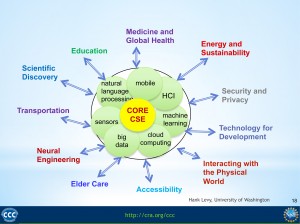 “On the Edge — The Future of Computing Research” was the title of a plenary session at the Computing Research Association’s (CRA) biennial Conference at Snowbird last month. And it’s a consistent theme of CRA’s Computing Community Consortium (CCC). Here’s the pitch:
“On the Edge — The Future of Computing Research” was the title of a plenary session at the Computing Research Association’s (CRA) biennial Conference at Snowbird last month. And it’s a consistent theme of CRA’s Computing Community Consortium (CCC). Here’s the pitch:
Our field has exhibited an ever-changing balance of “technology push” and “demand pull” over the years. Many currently sense a movement of the pendulum in the “demand pull” direction. I’d like to argue that this is fantastic — it’s great news for our field, great news for society, and great news for the future (read more following the link…).
A December 2010 President’s Council of Advisors on Science and Technology (PCAST) report on networking and information technology emphasized that further advances in computing are essential to tackling the vast majority of our national and global challenges.
Many Federal agencies don’t realize this — they may believe they can get by with increased application of today’s information technology, or they may have a narrow view of the roles that information technology can play in their ability to achieve their missions.
Many computing researchers don’t get it either. They have an “Oh, that’s just applications” mentality. In my view, here’s a more enlightened perspective:
- If “further advances in computing” are required, that’s our business!
- Some of the best fundamental research at the core of the field is driven by the requirements of putting the fruits of our labors to work.
- We should have an ever-expanding view of what our field encompasses — what Alfred Spector refers to as “the ever-expanding sphere of computer science.”
- The people who write the checks — and the students whom we seek to attract — are motivated more by “energy,” “transportation,” “education,” and “health” than by “architecture,” “operating systems,” “compilers,” and “programming languages.”
- Important: This isn’t to suggest that “architecture,” “operating systems,” “compilers,” and “programming languages” are no longer important. Far from it. Rather, as we drive forward advances in interdisciplinary areas like “energy,” “transportation,” “education,” and “health,” so, too, do we drive forward advances at the core of our field.
Take a look at my introductory talk for the session here. And take a look at the two “content” talks in the session that exemplify this expansive view of computing research — by two experts in HCI, sensing, and machine learning:
- Shwetak Patel (University of Washington), “Your Noise is My Signal“
- Daphne Koller (Stanford University), “Data-Driven Medicine“
And be sure to learn more about the computing research opportunities in areas of national priority on the CCC website — health, sustainability, education, and big data, to name a few.
(Contributed by Ed Lazowska, CCC Council Chair and University of Washington)










All this is nice..but we need to worry about the feedback effect…we
should not always sell our “computing souls” to those who write checks
or what students demand. We (as in the cs community) need to protect the core of cs
from the flavor of the month application (e.g., social media till the
crash of facebook) -irrespective of the size of the check. Sometimes it is good to decouple fundamental research from applications – like they do in Physics.